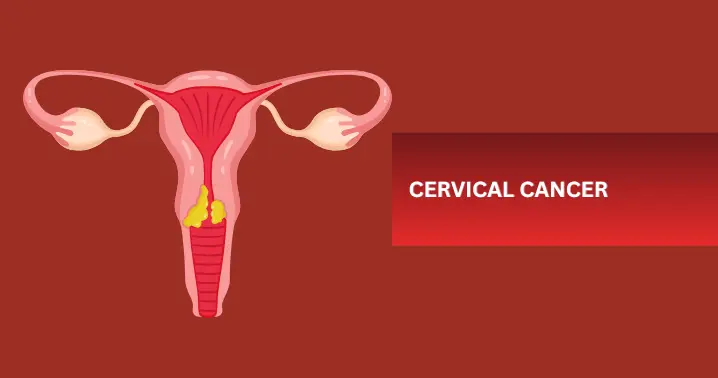- Home
- Cervix Cancer
Cervix Cancer

Cervix Cancer is one of the leading cancers affecting women worldwide, with over 600,000 new cases diagnosed each year.
It ranks as the fourth most common cancer among women globally and is more prevalent in countries with limited access to regular screening and HPV vaccination.
Mortality rates are significantly higher in developing regions due to delayed diagnosis, lack of awareness, and insufficient healthcare infrastructure.
However, factors such as early detection through Pap smear tests and HPV screening, along with advanced treatment options for cervical cancer in Ahmedabad, can drastically improve survival rates and reduce disease burden.
What is Cervix Cancer?
Cervix cancer, also known as cervical cancer, is a type of cancer that starts in the cervix. The cervix is a part of the female reproductive system that connects the uterus (womb) to the vagina. This cancer usually develops slowly, beginning with abnormal changes in the cells of the cervix, known as precancerous cells. If these abnormal cells are not removed or treated in time, they can turn into cancer and spread deeper into the tissues.
The main cause of most cervical cancer cases is a virus called human papillomavirus (HPV), which spreads mainly through sexual contact. HPV infection is very common, and in most cases, the body’s immune system naturally gets rid of the infection. However, if the infection lasts for a longer time, it can cause the normal cells of the cervix to become abnormal, which may eventually lead to cancer. There are usually no symptoms in the early stages, so regular screening and getting the HPV vaccine are important ways to prevent cervical cancer.
Signs and Symptoms of Cervix Cancer
Cervix cancer often shows no noticeable symptoms in its early stages. When signs do appear, they may include abnormal vaginal bleeding, unusual discharge, or pain during sex. Regular screening is important for early detection and treatment.
- Unusual vaginal bleeding (such as bleeding after sex, between periods, after menopause, or periods that are heavier or last longer than usual).
- Abnormal vaginal discharge (can be watery, bloody, or have a foul odor).
- Pain during sexual intercourse.
- Pelvic pain or pain in the lower back, between the hip bones, or in the lower belly.
- Pain during urination or bowel movements (especially in advanced stages).
- Swelling of the legs (in advanced stages).
- Fatigue and loss of appetite (may occur in later stages).
Causes of Cervix Cancer
Human Papillomavirus (HPV) Infection:
A long-term infection with high-risk HPV types is the leading cause of cervical cancer.
Multiple Sexual Partners:
Increases the risk of HPV exposure and sexually transmitted infections, raising cancer risk.
Early Sexual Activity:
Having sex at a young age can increase the chances of HPV infection over time.
Weakened Immune System:
A weak immune system can’t fight off HPV infections effectively, leading to cancer risk.
Smoking:
Tobacco by-products damage the DNA of cervix cells, increasing the likelihood of cancer.
Long-Term Use of Birth Control Pills:
Using oral contraceptives for 5+ years may slightly increase cervical cancer risk.
Poor Genital Hygiene:
Lack of cleanliness can contribute to persistent infections and long-term cervical damage.
Family History of Cervical Cancer:
A genetic predisposition can make some women more vulnerable to the disease.
Lack of Regular Screening
Skipping regular Pap smears or HPV tests can delay early detection of precancerous changes.
If You Notice Any of These Symptoms
Diagnosis of Cervix Cancer
1. Pap Smear Test
– Detects abnormal cervical cells
– Recommended regularly for early detection
2. HPV DNA Test
– Checks for high-risk HPV strains
– Often done with or after a Pap test
3. Colposcopy
– Uses a special microscope to view the cervix
– Done if Pap results are abnormal
4. Biopsy
– Small tissue sample taken from the cervix
– Confirms presence and type of cancer
5. Pelvic Examination
– Doctor checks cervix, uterus, and ovaries manually
– May feel abnormalities or swelling
6. Imaging Tests (MRI/CT/PET)
– Helps check cancer spread in the body
– Used for staging and treatment planning

Treatments for Cervix Cancer in Ahmedabad
Cervical cancer treatment in Ahmedabad is advanced, personalized, and accessible through a range of public and private healthcare institutions. Depending on the stage of the disease and the patient’s health condition, various treatment options are available.
Surgery
Surgical treatment is often recommended for early-stage cervical cancer.
Radical Hysterectomy – Removal of the uterus, cervix, and surrounding tissues.
Trachelectomy – A fertility-preserving surgery for selected early-stage patients.
Pelvic Lymph Node Dissection – Removal of lymph nodes to check cancer spread.
Radiation therapy
Radiotherapy is widely used either alone or in combination with chemotherapy.
External Beam Radiation Therapy (EBRT) – Targets cancer cells in the pelvic region.
Brachytherapy (Internal Radiation) – Delivers high-dose radiation directly to the cervix.
Chemotherapy
Chemotherapy uses powerful drugs to destroy cancer cells, especially in advanced stages.
Concurrent Chemoradiation – Combines chemo with radiation for better outcomes.
Systemic Chemotherapy – Used for recurrent or metastatic cervical cancer.
Targeted Therapy & Immunotherapy
For advanced or recurrent cases, modern therapies may be included.
Targeted Drugs – Attack specific cancer-related proteins.
Immunotherapy – Boosts the immune system to fight cancer cells.
Follow-up & Supportive Care
After treatment, regular follow-ups are essential to monitor recovery and prevent recurrence.
Nutritional support, physiotherapy, pain management, and counseling are also offered at most centers.
Conclusion
Cervical cancer is largely preventable with regular screening and awareness of its risk factors. Early detection and lifestyle precautions play a vital role in reducing the risk.

Why Dr. Ridham Shah
A Surgical Oncologist Practicing In The City Of Ahmedabad
- Experience of a decade in treating cancer
- Expertise in Laparoscopic cancer surgery, Robotic cancer surgery
- Expertise in Digestive System Cancers, Colorectal cancers , Peritoneal cancers, advanced abdominal cancers
- Expertise in Cytoreductive Surgery, HIPEC, PIPAC
- Excellent support staff to help you during treatment
- 360 degree care
Specialities

Ovary Cancer

Rectal Cancer

Colon Cancer

Endometrial Cancer

Liver Cancer

Esophageal Cancer

HIPEC Surgery

Robotic Surgery

Vulvar Cancer

Gallbladder Cancer

Stomach Cancer

Pancreatic Cancer

Cervix Cancer
